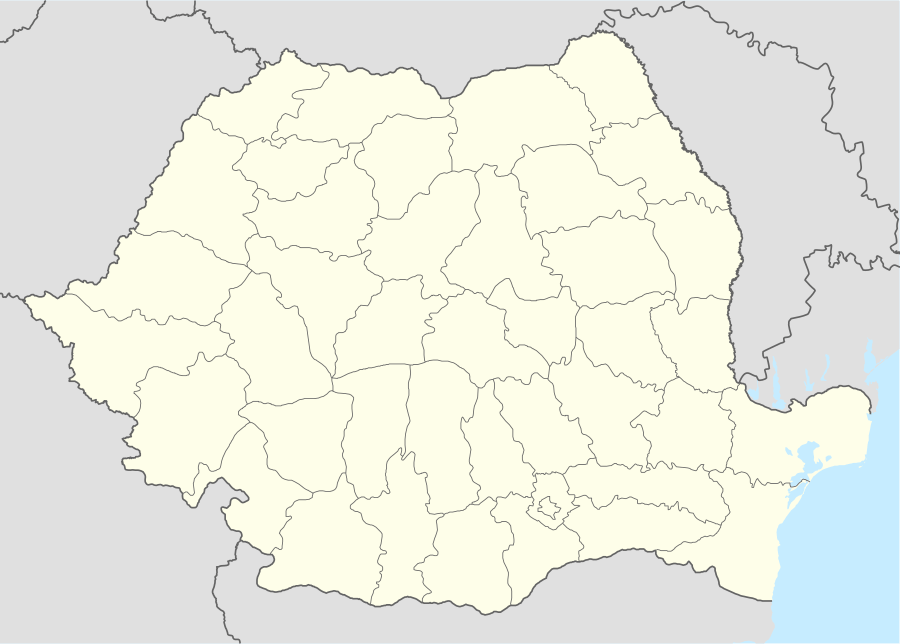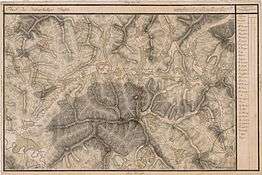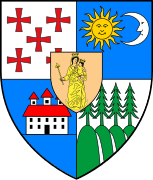Mugeni
Mugeni (Hungarian: Bögöz [ˈbøɡøz]) is a commune in Harghita County, Romania. It lies in the Székely Land, an ethno-cultural region in eastern Transylvania.
Mugeni Bögöz | |
|---|---|
 The Reformed church | |
 Location in Harghita County | |
 Mugeni Location in Romania | |
| Coordinates: 46°15′N 25°13′E | |
| Country | |
| County | Harghita |
| Government | |
| • Mayor | Mózes Farkas[1] (UDMR) |
| Area | 65.30 km2 (25.21 sq mi) |
| Population (2011)[2] | 3,491 |
| • Density | 53/km2 (140/sq mi) |
| Time zone | EET/EEST (UTC+2/+3) |
| Postal code | 537205 |
| Area code | +40 266 |
| Vehicle reg. | HR |
Component villages
The commune is composed of eight villages:
| In Romanian | In Hungarian | First recorded | Pop.(2002) |
|---|---|---|---|
| Aluniș | Székelymagyaros | In 1566 as Mogijoros | 143 |
| Beta | Béta | In 1566 as Beta | 304 |
| Dejuțiu | Décsfalva | In 1566 as Dechfalva | 200 |
| Dobeni | Székelydobó | In 1334 as Dobov | 587 |
| Lutița | Agyagfalva | In 1506 as Agyagfalva | 760 |
| Mătișeni | Mátisfalva | In 1567 as Mattijwsffalwa | 128 |
| Mugeni | Bögöz | In 1333 as Bugus | 1042 |
| Tăietura | Vágás | In 1334 as Voygias | 296[3] |
In 2004, the villages of Porumbenii Mari and Porumbenii Mici formed the commune of Porumbeni (Nagygalambfalva). The village of Betești (Betfalva) was transferred to the town of Cristuru Secuiesc that year.
History
The villages forming the present-day commune were part of the Székely Land region of the historical Transylvania province. They belonged to Csíkszék district until the administrative reform of Transylvania in 1876, when they fell within the Csík County in the Kingdom of Hungary. After the Treaty of Trianon of 1920, they became part of Romania and fell within Ciuc County during the interwar period. In 1940, the second Vienna Award granted Northern Transylvania to Hungary and the villages were held by Hungary until 1944. After Soviet occupation, the Romanian administration returned and the commune became officially part of Romania in 1947. Between 1952 and 1960, the commune fell within the Magyar Autonomous Region, between 1960 and 1968 the Mureș-Magyar Autonomous Region. In 1968, the province was abolished, and since then, the commune has been part of Harghita County.
Demographics
The commune has an absolute Hungarian (Székely) majority. According to the 2002 census it has a population of 5,869 of which 98.82% or 5,800 are Hungarian.[4]
Notable people
- Imre Palló (1891 - 1978): leading baritone at the Budapest State Opera
- Lajos Gidófalvy (1901 - 1945): military officer, antifascist activist
- János Kardalus (1935 - 2006): ethnographer
Gallery
 Josephinische Landaufnahme, 1769-1773
Josephinische Landaufnahme, 1769-1773 Josephinische Landaufnahme, 1769-1773
Josephinische Landaufnahme, 1769-1773
References
- (in Romanian) alegeri.tv - Alegeri locale 2012 - Rezultate alegeri Primăria Mugeni, judeţul Harghita Archived 2016-06-17 at the Wayback Machine; retrieved on March 25, 2013
- "Populaţia stabilă pe judeţe, municipii, oraşe şi localităti componenete la RPL_2011" (in Romanian). National Institute of Statistics. Retrieved 4 February 2014.
- János András Vistai. "Tekintő – Erdélyi Helynévkönyv". Missing or empty
|url=(help)Transylvanian Toponym Book - "Etnikai statisztikák" (in Hungarian). Árpád E. Varga. Retrieved 2010-05-20.
